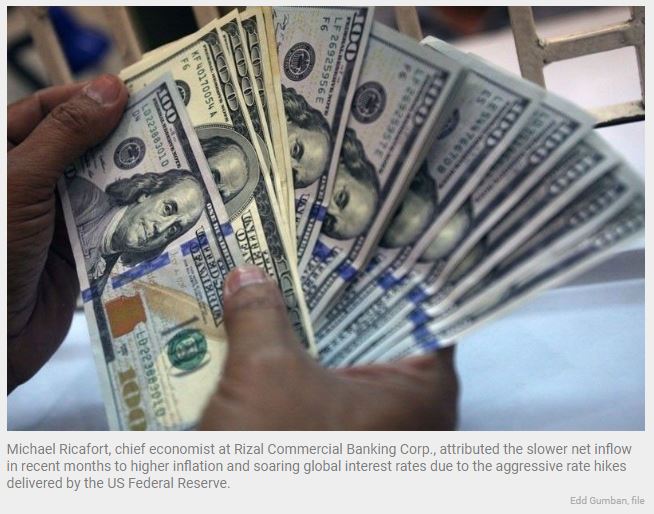Philippines: FDI slumps further to $626 million in September
MANILA, Philippines — The net inflow of foreign direct investments (FDIs) declined for the fourth straight month, tumbling by 7.9 percent to a two-month low of $626 million in September from $680 million a year ago amid external headwinds arising from tighter global financial conditions to fight soaring inflation.
Michael Ricafort, chief economist at Rizal Commercial Banking Corp., attributed the slower net inflow in recent months to higher inflation and soaring global interest rates due to the aggressive rate hikes delivered by the US Federal Reserve.
“This increases the risk of recession in the US, which is the world’s largest economy, that could slow down global trade, FDIs, remittances, employment, and other business or economic activities worldwide,” Ricafort said.
The net FDI inflow in September was the lowest since the $502 million recorded last July.
Other risk factors for FDI data, he said, include adverse economic effects of the Russia-Ukraine conflict since February that led to still relatively higher global commodity prices and inflation, more aggressive Fed rate hikes resulting in higher global interest rates, higher financing costs, and risk of recession in the US that could slow down FDI and global trade.
According to Ricafort, offsetting positive factors include measures to further reopen the economy toward greater normalcy, and some investment commitments by the Marcos administration in recent months.
The BSP said the decline in FDI net inflows reflected the decrease in non-residents’ net investments in debt instruments, which more than offset the growth in their net equity capital placements.
Investments in debt instruments, consisting mainly of intercompany borrowing between foreign direct investors and their subsidiaries or affiliates in the Philippines, plunged by 36.8 percent to $351 million in September from $555 million in the same month last year.
Likewise, reinvestment of earnings slipped by 4.8 percent to $88 million from $93 million.
On the other hand, equity placements soared by 158.7 percent to $230 million in September from $89 million in the same period last year.
Capital inflows coming mainly from Singapore, Japan and the US were channeled to financial and insurance, manufacturing as well as real estate industries.
Likewise, withdrawals fell by 24.2 percent to $43 million in September from $56 million in the same month last year.
“More and improved diplomatic relations recently would help improve the FDI data in the coming months,” Ricafort said.
He said increased adherence to environmental, social and governance standards in the Philippines, as encouraged by regulators worldwide could also boost net FDI inflow into the country.
For the nine-month period, net FDI inflow was down by 10 percent to $6.71 billion from a year-ago level of $7.46 billion.
“FDI remained subdued amid lingering concerns on global economic slowdown, higher inflation, and the depreciation of the peso,” the BSP said.
The net investments of debt instruments declined by 12 percent to $4.69 billion from January to September compared to $5.33 billion in the same period last year as foreign companies settled more debt.
Likewise, reinvestment of earnings decreased by 7.7 percent to $924 million from $1 billion.
Equity placements from Japan, Singapore, the US and Malaysia retreated by 12.2 percent to $1.29 billion from $1.46 billion, while withdrawals plunged by 43 percent to $192 million from $337 million.
The BSP further lowered its net FDI inflow target to $8.5 billion for this year and to $11 billion for next year.
Dennis Lapid, officer-in-charge of the Department of Economic Research at the BSP, said the country is expected to book a net inflow of FDIs until next year amid the expected recovery from the economy as well as the continued implementation of investment friendly legislation, including the removal of key restrictions on foreign ownership of domestic enterprises.
“At the same time, uncertainty remains given that global growth is also expected to moderate in 2023 and therefore could lead to greater investor caution,” Lapid said.
Aside from the weaker global economic picture, Lapid also cited the aggressive monetary tightening done by major economies led by the US Fed that tend to dampen demand for investors
Source: https://www.philstar.com/business/2022/12/13/2230379/fdi-slumps-further-626-million-september


 Thailand
Thailand




